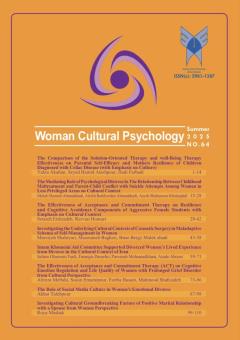Investigating Cultural Groundbreaking Factors of Positive Marital Relationship with a Spouse from Women Perspective
Subject Areas : Psychology
1 - Assistant Professor, Department of Psychology, Faculty of Educational Sciences and Psychology, Shahid Ashrafi Esfahani University, Isfahan, Iran
Keywords: Cultural factors, Positive marital relationship, Women perspective,
Abstract :
The present study was intended to investigate the cultural groundbreaking factors of positive marital relationship with a spouse from women perspective. The research universe embraced all cultural and psychological texts related to women. The sample enfolded texts related to cultural groundbreaking factors of positive marital relationship with a spouse from women perspective. The research method was descriptive-analytical. The library method was implemented to collect texts of data related to the topic. Then the obtained data were analyzed. The findings identified 9 cultural factors. These factors included traditional values, communication patterns, attitudes towards gender, social pressures, media, expectations of the role of motherhood, education, religious attitudes and family upbringing. The findings also showed that cultural factors had a great impact on the quality of positive marital relationships, which was often shaped through traditional values, communication patterns, attitudes towards gender, social pressures, media, expectations of the role of motherhood, education, religious attitudes, and family upbringing. These factors were among the key cultural factors that could facilitate or restrict marital relationships. In other words, a deep and comprehensive understanding of the cultural factors that created the basis for positive marital relationships from women perspective could help to design effective educational, counseling, and media programs to strengthen marital relationships.
Adaki, A. Y., & Wajim, J. (2024). Cultural adaptation and marriage dissolution. Vejoh-Veritas Journal of Humanities, 5(1), 100-113. URL: https://acjol.org/index.php/veritas/article/view/4337
Ahmadi, F., Asgari, P., & Khosravi, Z. (2023). Social expectations and marital conflicts in Iranian women. Women's Studies International Forum, 98, 102743. [Persion] DOI: 10.1016/j.wsif.2023.102743
Ahsan, S. (2022). Role of religion in peacebuilding and conflict resolution: case study of Islam. Reality of Politics. Estimates-Comments-Forecasts, 22(4), 7-27. URL: https://www.ceeol.com/search/article-detail?id=1100983.
AliZadeh, M., & Mohammadi, A. (2022). Cultural values and marital satisfaction among Iranian women. Journal of Women and Family Studies, 9(1), 89–104. [Persion] DOI: 10.22059/jwrr.2022.345678.900
Alonso-Ferres, M., Righetti, F., Valor-Segura, I., & Expósito, F. (2021). How power affects emotional communication during relationship conflicts: The role of perceived partner responsiveness. Social Psychological and Personality Science, 12(7), 1203-1215. DOI: 10.1177/1948550621996496
Bakaan, S., & Safarzadeh, S. (2023). The effectiveness of marital life enrichment training on excitement during pregnancy, on love, selfless behaviors and sexual health literacy of young couples. The Women and Families Cultural-Educational, 18(62), 121-141. [Persion] URL: https://cwfs.ihu.ac.ir/article_207842.html?lang=fa
Deschênes, M., Bernier, A., Cyr, C., Paradis, A., & Rassart, C. A. (2023). Marital satisfaction, parenting stress, and family alliance: Parental perspective taking as a moderator. Family Process, 62(3), 1147-1160. URL: https://onlinelibrary.wiley.com/doi/abs/10.1111/famp.12812
Elbanna, M. (2025). The existence of career women in egypt from a social cultural and economic perspective. Solo International Collaboration and Publication of Social Sciences and Humanities, 3(01), 13-26. DOI: https://doi.org/10.61455/sicopus.v3i01.221
Golafshani, N., Javadian, H., & Farahani, H. (2023). Parental influence on marital expectations among iranian women. Journal of Family Studies, 11(1), 33–48. [Persion] DOI: 10.22059/jfs.2023.378901
Gomez, E., & Tadros, E. (2024). A cognitive behavioral family therapy approach: The impact of divorce on a hispanic adolescent with an eating disorder. The Family Journal, 32(2), 206-214. URL: https://journals.sagepub.com/doi/abs/10.1177/10664807231163244
Hall, E.T. (2022). The dance of life: The other dimension of time. Intercultural Communication Research, 46(3), 221–235. DOI:10.1080/15298868.2017.1348370
Hofstede, G. (2011). Dimensionalizing cultures: the Hofstede model. Online Readings in Psychology and Culture, 2(1), 2307-0919. 26 URL: https://moodle.studiumdigitale.uni-frankfurt.de/moodle/pluginfile.php/81199/mod_resource/content/1/Dimensionalising%20Cultures%20The%20Hofstede%20Model%20in%20Context%20Part%20A30032020.pdf
Kazim, S. M., & Rafique, R. (2021). Predictors of marital satisfaction in individualistic and collectivist cultures: a mini review. Journal of research in psychology, 3(1), 55-67. URL: https://research-management.mq.edu.au/ws/portalfiles/portal/357039046/356612656.pdf
Khojastefard, D. (2018). An overview of the relationship of marital intelligence and emotional support with life satisfaction in married men and women. Studies in Psychology and Medicine, 46(5), 31-42. [Persion] URL: https://www.noormags.ir/view/fa/articlepage/1603674/%D9%85%D8%B1%D9%88%D8%B1%DB%8C-%D8%A8%D8%B1-%D8%B1%D8%A7%D8%A8%D8%B7%D9%87-%D9%87%D9%88%D8%B4-%D9%88-%D8%AD%D9%85%D8%A7%DB%8C%D8%AA-%D8%B9%D8%A7%D8%B7%D9%81%DB%8C-%D8%B2%D9%86%D8%A7%D8%B4%D9%88%DB%8C%DB%8C-%D8%A8%D8%A7-%D8%B1%D8%B6%D8%A7%DB%8C%D8%AA-%D8%A7%D8%B2-%D8%B2%D9%86%D8%AF%DA%AF%DB%8C-%D8%AF%D8%B1-%D8%B2%D9%86%D8%A7%D9%86-%D9%88-%D9%85%D8%B1%D8%AF%D8%A7%D9%86-%D9%85%D8%AA%D8%A7%D9%87%D9%84
Maciver, J. E., & Dimkpa, D. I. (2012). Factors influencing marital stability. Mediterranean. Journal of Social Sciences, 3(1), 437-442. URL: https://www.richtmann.org/journal/index.php/mjss/article/view/10977.
Najafi, M., Pourgharib, Sh., & Hosseini, S. (2023). Motherhood expectations and marital satisfaction in Iranian women. Journal of Women’s Studies, 21(1), 45-60. [Persion] DOI:10.22059/jws.2023.367890
Pudlo, M. K. (2021). Family-of-origin ties and relationships and how they affect dealing with one's own marital conflicts. Kwartalnik Naukowy Fides ET Ratio, 46(2), 173-204. URL: https://doi.org/10.34766/fetr.v46i2.829
Rezaei, H. & Naseri, Z. (2022). Religious beliefs and marital adjustment among Iranian women. Iranian Journal of Religion and Health, 5(1), 112–126. [Persion] DOI: 10.22034/irjh.2022.43201
Shojaei, M., & Kargar, S. (2023). Media Influence on Marital Expectations Among Young Women in Urban Areas. Iranian Journal of Media Studies, 15(2), 77–94. [Persion] DOI:10.22059/ijms.2023.356789
Timan, M., Safarzadeh, S., & Fathi, K. (2025). Test of Marital Intimacy Model Based on Spouse Communication Model and Primary Family Health with the Mediation of Self-Differentiation. Iranian Journal of Psychiatric Nursing, 12(6), 1-15. [Persion] URL: https://mail.ijpn.ir/article-1-2489-en.html
Yodanis, C. & Lauer, S. (2023). Gender equality in marriage: Cross-national perspectives on couple relationships. Theory and Society, 52(1), 101–120. DOI: 10.1177/02632764231163210
Yuan, Q., Fan, Z., & Leng, J. (2022). The effect of emotional reactivity on marital quality in Chinese couples: The mediating role of perceived partner responsiveness. Frontiers in Psychology, 12, 787899. DOI: 10.3389/fpsyg.2021.787899

